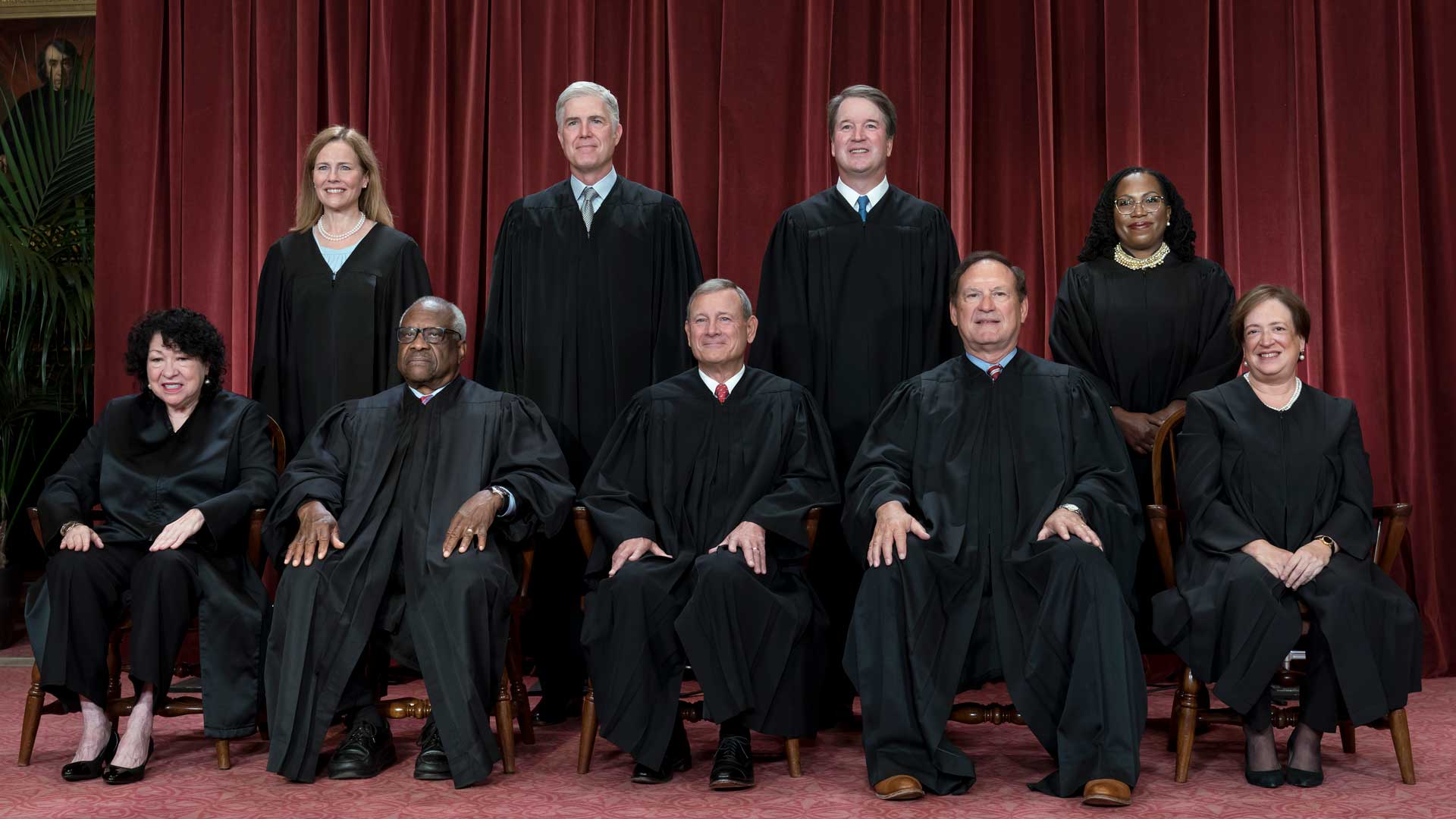 Members of the Supreme Court sit for a new group portrait following the addition of Associate Justice Ketanji Brown Jackson, at the Supreme Court building in Washington, Friday, Oct. 7, 2022. Bottom row, from left, Justice Sonia Sotomayor, Justice Clarence Thomas, Chief Justice of the United States John Roberts, Justice Samuel Alito, and Justice Elena Kagan. Top row, from left, Justice Amy Coney Barrett, Justice Neil Gorsuch, Justice Brett Kavanaugh, and Justice Ketanji Brown Jackson.
Members of the Supreme Court sit for a new group portrait following the addition of Associate Justice Ketanji Brown Jackson, at the Supreme Court building in Washington, Friday, Oct. 7, 2022. Bottom row, from left, Justice Sonia Sotomayor, Justice Clarence Thomas, Chief Justice of the United States John Roberts, Justice Samuel Alito, and Justice Elena Kagan. Top row, from left, Justice Amy Coney Barrett, Justice Neil Gorsuch, Justice Brett Kavanaugh, and Justice Ketanji Brown Jackson.
While the U.S. Supreme Court struck down higher education admission policies that factor applicants’ race into consideration, educational institutions in Arizona likely won’t see an impact on their existing admissions policies or recruitment of persons of color.
The court’s 6-3 decision ruled that university and college admission policies that consider applicants’ race in admissions policies violate the Equal Protection Clause of the Fourteenth Amendment to the U.S. Constitution.
However, in Arizona, this ruling won’t have much of an impact because in 2010 voters passed Proposition 107, which said the state cannot discriminate or give preferential treatment based on someone’s " race, sex, color, ethnicity, or national origin" in places of public employment, contracting or educational institutions. The ballot question passed 59.51% to 40.49%.
Arizona Board of Regents Chair Lyndel Manson said in a statement that admission standards set by the board are based on academic performance only.
“The admission standards set by the Arizona Board of Regents for Arizona’s public universities are based solely on academic performance,” read Manson’s statement, which was sent to AZPM via email. “The board is proud that each of Arizona’s public universities are Hispanic Serving Institutions and student enrollment continues to grow in diversity. We are reviewing the decision of the U.S. Supreme Court but do not anticipate any impact at our universities.”
However, questions arise about the effect the ruling will have on the recruitment of persons of color to higher education, specifically, Hispanic Serving Institutions or HSIs that require 25% of the student population to be Hispanic for the designation.
Dr. Dana Horne, the Vice President of Student Services at Cochise College, said that the public community college is an HSI and 44% of its student population identifies as Hispanic. She said the ruling does not affect Cochise College’s admission policies, as it is an open-enrollment community college.
However, she said it could impact potential grants the college could receive if they are based on specialized criteria like being an HSI and a rural community college.
“We were exploring a grant that some of the criteria to be eligible for that grant was you needed to be an HSI and you needed to be a rural community college,” Horne said. “That type of grant, for example, would help us with reaching our rural communities and helping to provide pathways for either returning students or high school students to get a college education. We look for funding for those types of things to do some specialized programming for students … But in the future if those opportunities aren’t there, that might impact our future students because we may not be able to provide as many services or programs to really help our county students."
Horne said the college currently does not receive any federal funding through its HSI designation and the court’s decision will not impact the college’s recruitment of Hispanic and Latino students.

By submitting your comments, you hereby give AZPM the right to post your comments and potentially use them in any other form of media operated by this institution.